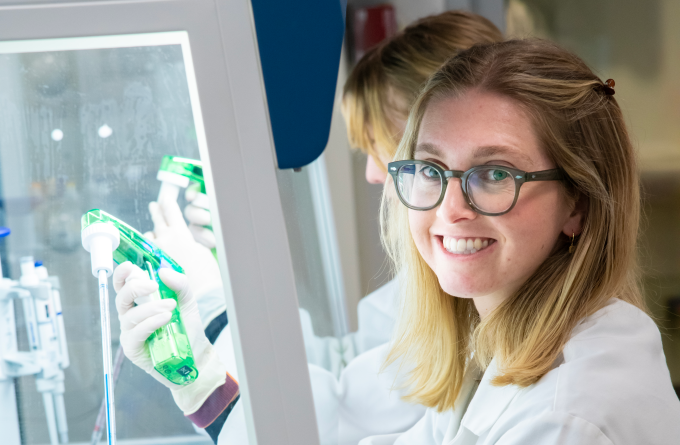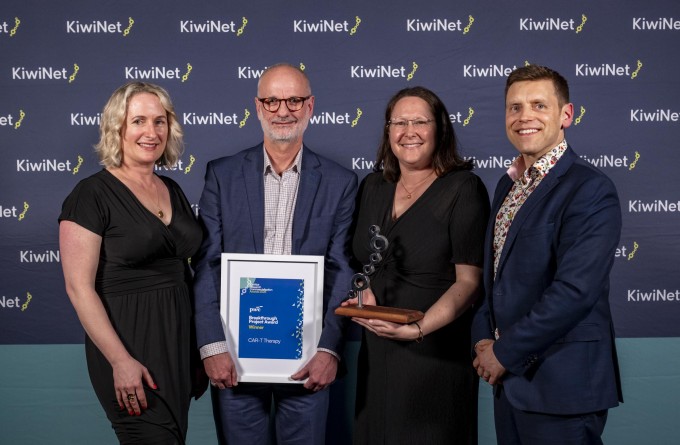31 May 2023
Our immune system protects us from infection and disease throughout our life. Like us, it grows and evolves as we encounter new and familiar infectious organisms. In a similar vein, as we age, the immune system also ages, becoming less efficient and effective.

Dr Theresa Pankhurst (left) and Dr Michelle Linterman
One of the most significant changes is that the older immune system responds less effectively to vaccines, producing fewer protective antibodies, offering less protection from disease. Why this happens is only just starting to be understood, with Cambridge’s Babraham Institute leading global research into the fundamental biological changes of an ageing immune system. And in a new research collaboration with the Malaghan Institute, funded by the Biotechnology and Biological Sciences Research Council – part of UK Research and Innovation – there is hope that the ageing immune system can be revitalised. The partnership aims to hone in on ‘germinal centres’, a unique immunological structure that forms in response to an infectious organism, and use RNA technology to improve its performance.
“This collaboration brings together the fundamental biology of the germinal centre response in ageing that we’ve developed at the Babraham Institute, with the Malaghan Institute’s mRNA vaccine development platform,” says Dr Michelle Linterman, who heads the Linterman Laboratory at the Babraham Institute. “Our combined expertise puts us in a unique position to make and test new mRNA vaccines that we hope will rejuvenate the ageing immune system and promote health in the later years of life.”
What are germinal centres and why are they important for fighting infections?
Germinal centres are immunological structures made up of immune cells that form in lymph nodes or the spleen during infection or following vaccination. The germinal centre is where weakened or deactivated infectious agents are presented, analysed and countered. These temporary structures, which last only a few weeks, are where high-quality and long-lived antibody-secreting cells are produced – cells that enable robust, enduring protection from infectious disease.
Part antibody factory, part art studio, germinal centres are immunological laboratories where antibodies get made, tested and prepared for distribution. Inside a single germinal centre millions of antibodies are created, all with slight variations. These antibodies get tested against the infection until a perfect match is found. Once the match is made, germinal centres also produce long-lived memory B-cells that can respond to any future infection of the same kind.
For germinal centres to function optimally, multiple immune cell types must come together, congregating in the right place at the right time to help make protective antibodies. This includes B-cells (that produce antibodies) and T follicular helper cells (a type of T- cell that helps the B-cell make antibodies).
With millions of cells working in sync, germinal centres are key to effective, long-lived protection from infectious disease. If something were to go wrong, or perhaps become less efficient, it results in a lower-quality protective immune response. This is what happens with ageing immune systems – with the germinal centres’ response declining with age. This is one of the reasons why older people need more frequent vaccination, to compensate for their germinal centre’s declining performance.
“We saw plenty of evidence of this during the COVID-19 vaccine rollout (including the Vaccine Alliance Aotearoa New Zealand’s Ka Mātau Ka Ora study) where it became a priority for older people to receive boosters to enhance their levels of protective antibodies,” says Malaghan Institute’s Dr Theresa Pankhurst, who is currently seconded to the Babraham Institute as part of the Te Urungi Churchill College By-Fellowship.
Using RNA tech to target immune cells in germinal centres
RNA technology, the ability to package cellular instructions – such as a vaccine or therapeutic agent – in microscopic bubbles and deliver them to cells like a courier service, is revolutionising biomedicine. It may also be the key to boosting ailing germinal centres by targeting the immune cells inside them.
“The COVID-19 pandemic propelled mRNA vaccines into the spotlight and highlighted their potential across many applications,” says Dr Linterman. “Although there is plenty of evidence demonstrating how the immune system responds to mRNA vaccination, very little of this has taken age into account or how mRNA vaccines can be improved to be more effective for older people.”
By assisting waning immune cells through targeted RNA technology, it may be possible to artificially sustain germinal centre efficiency – offering the same protection of a younger, stronger immune system.
“Through this partnership we aim to investigate the germinal centre response to mRNA vaccination and how this changes with age. Furthermore, we can encode our mRNA vaccines with specific ingredients we have hypothesised might improve the age-related decline of the germinal centre, and then test these in aged mice.”
Malaghan Institute Director Professor Graham Le Gros says the collaboration is a fantastic opportunity to combine world-class expertise and leaders in the fields of immunology to tackle a key health issue which is ageing immune systems. “Through this partnership we will gain access to cutting-edge genetic and molecular immunology tools we don’t have access to in New Zealand. This really will be a step up in what we can do for improving vaccinations for some of our most vulnerable people.”
Related articles

How a quirk of the immune system may play a big role in protecting us from disease
18 December 2025

The nose knows: new research explores next generation of nasal vaccines
2 December 2025

Marsden funding to drive discovery and innovation in cancer, allergy and infectious disease research
5 November 2025

Making local impact using global training in liver cancer research
30 October 2025

Improving immunotherapies for lung cancer
29 October 2025

Malaghan CAR T programme wins KiwiNet Research Commercialisation Award
23 October 2025
